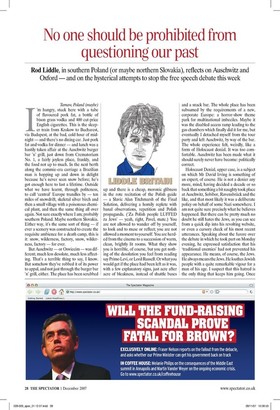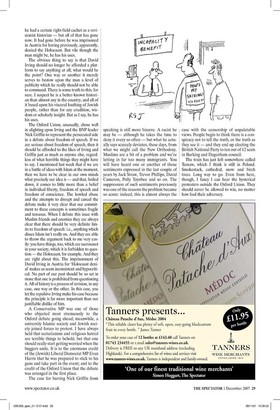No one should be prohibited from questioning our past
Rod Liddle, in southern Poland (or maybe northern Slovakia), reflects on Auschwitz and Oxford — and on the hysterical attempts to stop the free speech debate this week Tamaw, Poland (maybe) 1 'm hungry, stuck here with a tube of flavoured pork fat, a bottle of bison grass vodka and 400 cut-price English cigarettes. This is the sleeper train from Krakow to Bucharest, via Budapest, at the bad, cold hour of midnight — and there's no dining car. Just pork fat and vodka for dinner — and lunch was a hastily taken affair at the Auschwitz burger bar 'n' grill, just down from Crematorium No. 1, a fairly joyless place, frankly, and the food not up to much. In the next berth along the commie-era carriage a Brazilian man is hopping up and down in delight because he's never seen snow before; he's got enough here to last a lifetime. Outside what we have learnt, through politeness, to call 'central' Europe trundles by — ten miles of snowdrift, skeletal silver birch and then a small village with a poisonous chemical plant, and then the same thing all over again. Not sure exactly where I am; probably southern Poland. Maybe northern Slovakia. Either way, it's the same sort of thing — if ever a scenery was constructed to create the requisite ambience for a death camp, this is it: snow, wilderness, factory, snow, wilderness, factory — for ever.
But Auschwitz — or Oswiecim — was different; much less desolate, much less affecting. That's a terrible thing to say, I know. But somehow they've robbed it of its power to appal, and not just through the burger bar 'n' grill, either. The place has been scrubbed up and there is a cheap, moronic glibness in the rote recitation of the Polish guide — a Slavic Alan Titchmarsh of the Final Solution, delivering a homily replete with banal observations, repetition and Polish propaganda. (Za Polish people LUFFED za Jews' — yeah, right, Pavel, mate.) You are not allowed to wander off by yourself, to look and to muse or reflect; you are not allowed a moment to yourself. You are herded from the cinema to a succession of warm, clean, brightly lit rooms. What they show you is horrible, of course, but you get nothing of the desolation you feel from reading say Primo Levi, or Lord Russell. Or what you would get if the place had been left as it was, with a few explanatory signs, just acre after acre of bleakness, instead of shuttle buses and a snack bar. The whole place has been subsumed by the requirements of a new, corporate Europe: a horror-show theme park for multinational imbeciles. Maybe it was the disabled access ramp leading to the gas chambers which finally did it for me, but eventually I detached myself from the tour party and left Auschwitz, by way of the bar. The whole experience felt, weirdly, like a form of Holocaust denial. It was too comfortable. Auschwitz has been made what it should surely never have become: politically correct.
Holocaust Denial, upper case, is a subject on which Mr David Irving is something of an expert, of course. He is not a denier any more, mind, having decided a decade or so back that something a bit naughty took place at Auschwitz, Sobibor, Ravensbruck and the like, and that most likely it was a deliberate policy on behalf of some Nazi somewhere. I am not quite sure precisely what he believes happened. But there can be pretty much no doubt he still hates the Jews, as you can see from a quick dip into his revolting website, or even a cursory check of his most recent utterances. Speaking about the furore over the debate in which he took part on Monday evening, he expressed satisfaction that his 'traditional enemies' had not prevented his appearance. He means, of course, the Jews. He always means the Jews. He loathes Jewish people with a quite remarkable vigour for a man of his age. I suspect that this hatred is the only thing that keeps him going. Once he had a certain right-field cachet as a revisionist historian — but all of that has gone now. It had gone before he was imprisoned in Austria for having previously, apparently, denied the Holocaust. But vile though the man might be, he has his uses.
The obvious thing to say is that David Irving should no longer be afforded a platform to say anything at all; what would be the point? One way or another it merely serves to bestow upon the man a level of publicity which he really should not be able to command. There is some truth to this, for sure. I suspect he is a better-known historian than almost any in the country, and all of it based upon his visceral loathing of Jewish people, rather than for any erudition, wisdom or scholarly insight. But as I say, he has his uses.
The Oxford Union, unusually, chose well in alighting upon Irving and the BNP leader Nick Griffin to represent the persecuted side in a debate about freedom of speech. If we are serious about freedom of speech, then it should be afforded to the likes of Irving and Griffin just as much as anyone else, regardless of what horrible things they might have to say. I mentioned last week that if we are in a battle of ideas with Islam at the moment, then we have to be clear in our own minds what precisely our idea is — and that, boiled down, it comes to little more than a belief in individual liberty, freedom of speech and freedom of conscience. The howled abuse and the attempts to disrupt and cancel the debate make it very clear that our commitment to these concepts is sometimes fragile and tenuous. When I debate this issue with Muslim friends and enemies they are always clear that there should be very definite limits to freedom of speech: i.e., anything which disses Islam isn't really on. And they are able to throw the argument back to me very easily: you have things, too, which are sacrosanct in your society, which it is forbidden to question — the Holocaust, for example. And they are right about this. The imprisonment of David Irving in Austria for 'Holocaust denial' makes us seem inconsistent and hypocritical. No part of our past should be so set in stone that one is prohibited from questioning it. All of history is a process of revision, in any case, one way or the other. In this case, you let the repulsive Irving make his case because the principle is far more important than our justifiable dislike of him A Conservative MP was one of those who objected most strenuously to the Oxford debate going ahead; meanwhile, a university Islamic society and Jewish society joined forces to protest. I have always held that sectarianism and religious hatred are terrible things to behold, but that one should really start getting worried when the buggers unite. It is to the enormous credit of the (Jewish) Liberal Democrat MP Evan Harris that he was prepared to stick to his guns and take part in the event; and to the credit of the Oxford Union that the debate was arranged in the first place.
The case for barring Nick Griffin from speaking is still more bizarre. A racist he may be — although he takes the time to deny it every so often — but what he actually says scarcely deviates, these days, from what we might call the New Orthodoxy. Muslims are a bit of a problem and we're letting in far too many immigrants. You will have heard one or another of those sentiments expressed in the last couple of years by Jack Straw, Trevor Phillips, David Cameron, Polly Toynbee and so on. The suppression of such sentiments previously was one of the reasons the problem became so acute: indeed, this is almost always the case with the censorship of unpalatable views. People begin to think there is a conspiracy not to tell the truth, or the truth as they see it — and they end up electing the British National Party to ten out of 12 seats in Barking and Dagenham council.
The train has just left somewhere called Tarnaw, which I think is still in Poland. Smokestack, cathedral, snow and birch trees. Long way to go. Even from here, though, I fancy I can hear the hysterical protesters outside the Oxford Union. They should never be allowed to win, no matter how foul their adversary.






































































 Previous page
Previous page